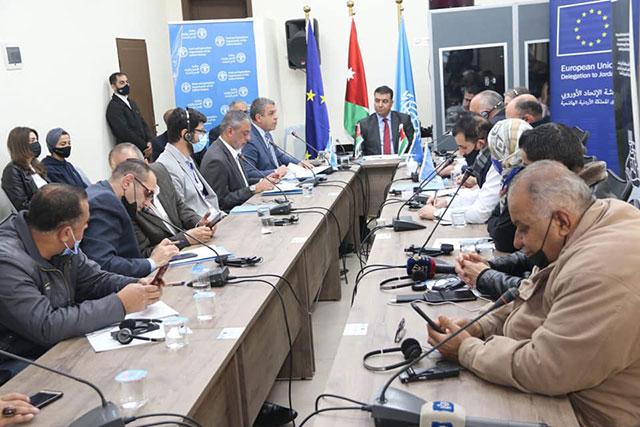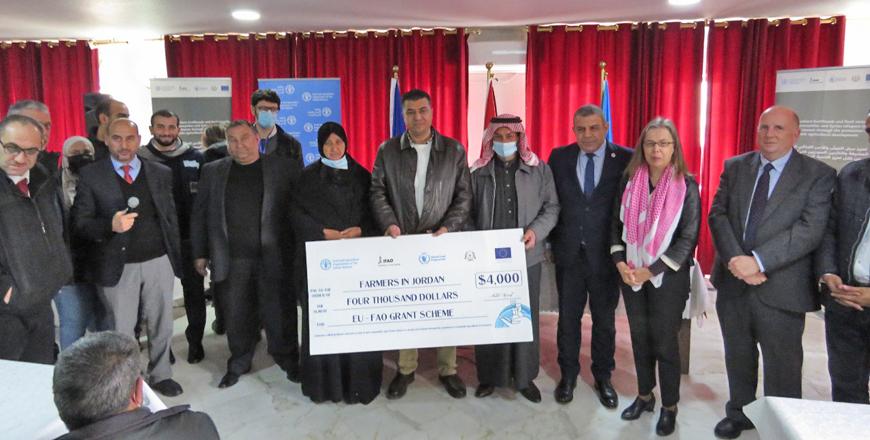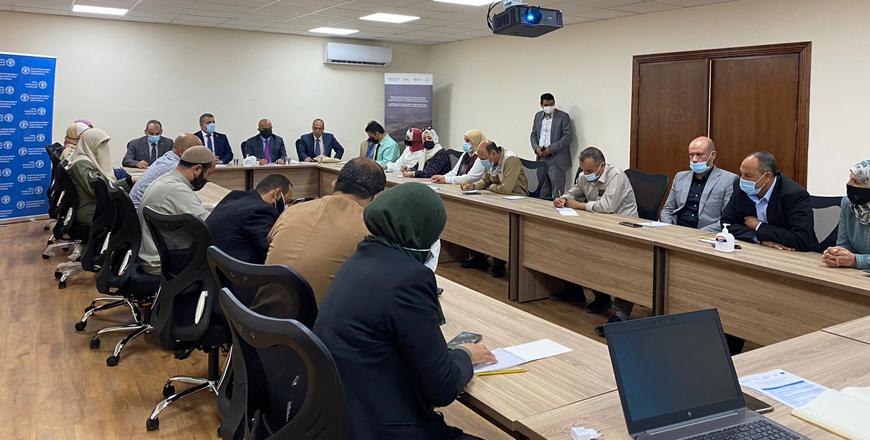You are here
FAO inaugurates 22 rehabilitated agricultural centres through EU-funded project in Jordan
By JT - Dec 07,2021 - Last updated at Dec 07,2021

Participants during a ceremony organised by the Food and Agriculture Organisation of the United Nations on Monday to mark the inauguration and handover of 22 rehabilitated National Agricultural Training Facilities to the Ministry of Agriculture in Jordan (Photo courtesy of FAO)
AMMAN — The Food and Agriculture Organisation of the United Nations (FAO) on Monday held a ceremony to mark the inauguration and handover of 22 rehabilitated National Agricultural Training Facilities to the Ministry of Agriculture in Jordan.
The renovation was made possible through the “Enhancing resilient livelihoods and food security of host communities and Syrian refugees in Jordan and Lebanon through the promotion of sustainable agricultural development” project that is funded by the European Union through its Regional Trust Fund in Response to the Syrian crisis (MADAD), according to a FAO statement.
The project is implemented by FAO in cooperation with the Ministry of Agriculture, World Food Programme (WFP) and the International Fund for Agricultural Development (IFAD).
The handover ceremony was held in Jarash Governorate, which is one of the 22 rehabilitated centres across the 12 governorates; Amman, Irbid, Balqa, Salt, Karak, Tafileh, Aqaba, Ajloun, Zarqa, Madaba and Mafraq.
These facilities underwent rehabilitation works and were provided with equipment and tools required to host training programmes on climate-smart agriculture, sustainable management and utilisation of natural resources, including land, water, climate and genetic resources for the benefit of Syrian refugees and host communities.
Agriculture Minister Khalid Hneifat said that this project supports the ministry’s efforts in developing agricultural guidance and placing it within its guiding path for the sector, in a way that ensures the availability of training for farmers towards crops with more economic value, adequate for market requirements, and support food security.
Hneifat valued this support and cooperation from the partners, which represents “a real and tangible achievement” and is in alignment with the ministry’s plans to develop and modernise the cadres of the ministry and the agricultural sector.
The Deputy Head of Cooperation at the EU Delegation in Jordan, Sirpa Tulla, said: “The rehabilitation of 22 National Agricultural Training Facilities is within the framework of the ‘Enhancing resilient livelihoods and food security of host communities and Syrian refugees in Jordan through promoting sustainable agricultural development’ project funded by the EU through its Regional Trust Fund in Response to the Syrian Crisis (MADAD). We are very proud to see the progress of the excellent partnership developed with the government of Jordan and our UN partners."
FAO’s Representative in Jordan Nabil Assaf said: “The conflict in Syria has triggered the world’s largest humanitarian crisis. Refugees from Syria are the biggest refugee population from a single conflict in a generation. FAO is glad to be in the forefront of the implementation of the EU Regional Trust Fund in Response to the Syrian Crisis (MADAD FUND) and contribute with our partners WFP and IFAD to addresses the socio-economic needs of Syrian refugees while also supporting overstretched local communities and their administrations.”
“The new 22 training centres inaugurated today will enhance the ability of the Ministry of Agriculture and farmer groups to develop capacity of host and refugee’s communities,” he added.
“We cannot ignore the importance of investing in natural ecosystems in a country like Jordan that has been impacted by climate change and stressed by limited natural resources. The EU-funded Madad project presents a great opportunity for the three Rome-based agencies to work together under the leadership of the Ministry of Agriculture to support Jordan address its climate change challenges while creating sustainable livelihood opportunities to the most vulnerable,” said Alberto Correia Mendes, Representative and Country Director of the WFP.
The new facilities will be used to run capacity building for farmers (Jordanian and Syrian refugees) as well as training of trainers (ToT) to provide skilled teachers to support all current and planned education activities.
Related Articles
AMMAN — With funding from the European Union, the Food and Agriculture Organisation of the United Nations (FAO) in Jordan on Monday awarded
AMMAN — A project aimed at enhancing resilient livelihoods and food security for more than 260,000 Jordanians and Syrian refugees through su
AMMAN — The Food and Agriculture Organisation of the United Nations (FAO) on Monday launched an advanced Training of Trainers (ToT) programm













